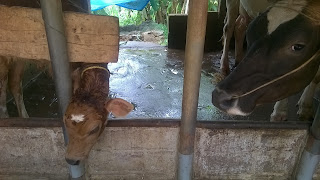Ammu Muthashi's Death
When Ammu muthashi died, they
tied a bed sheet across the cowshed, so the four cows and the calf wouldn’t see
the body being taken out to be cremated. Ammu muthashi was sick for a very long
time- though everyone had a different notion of how many months or years
exactly. She was bed-ridden for ‘so long’, Amma told me. Dhanya chechi, Ammu
muthashi’s granddaughter, was glad that her first son could be blessed by his
great-grandmother before she passed. Kochachan was glad that he took a picture
of her on his new SLR camera, more than ten years ago. I was there when he took
the picture- he made her stand at the doorway of her son’s- his cousin’s-
house. That was the last time I had seen Kochachan- relatives have a way of
disappearing into obscurity, and when that obscurity is in Louisiana, one doesn’t
go looking.
A few days after the death, Kochachan
updated his status on Facebook. He posted the picture of Ammu muthashi with a
description of a loving aunt. I chuckled, but then, immediately realised that
he had a life in rural Kerala before the obscurity of Louisiana gobbled him.
Ammavan was very sad; she was
his mother, after all. Amma told me that he kept swabbing her dried lips with a
damp cloth, long after she had lost consciousness. Amma had a flair for
recalling such minor details with the more-than-adequate amount of dramatics-
she could raise and lower her voice, and emphasise certain words, and sway her
fingers. Later, when my grandfather died, and when we swabbed his lips with a
damp cloth, long after he was dead, I wondered whether my mother would recall
this too with an element of drama.
Ammu muthashi’s daughter-in-law
loved her. She told me how, on the morning of the death, the rice on the stone
stove had boiled over and spilt on to the flames. This was a sign of death-
rice boiling over without being cooked properly. She pushed the coconut husks
into the same stove as she told me this. My grandmother nodded as she listened
to this, and wiped the sweat off her brow. This time, no rice-cooked or
uncooked- boiled over. But a month later, Ammu muthashi’s daughter died when a van
sped around a corner and hit her one morning when she was delivering milk to
the neighbours.
When I told Amma about the
story of the rice boiling over, she laughed scornfully and told me not to
believe in such tales.
Achan came home after the cremation;
he was excited because of the new crematoria. A year ago, he had to cremate his
mother the old fashioned-way: with wood and oil and fire. Ammu muthashi was
lost in the obscurity of an electric crematorium as impersonal as the guillotine
in Kafka’s story. But because there was a receipt, it was possible to trace the
remains of Ammu muthashi’s bodies.
I could not go for the
cremation, because I was a woman. Electric or not, cremation was a man’s
business.
I remember Ammu muthashi in her
white mundu tied around her waist and reaching till her ankles. A thin, cotton
towel was draped around her translucent white blouse. I loved the feel of her
crinkled skin. As a child, I had wondered whether all old people had such skin.
As a child, I also thought that when I grow big, old people would become kids,
and that it was an endless cycle. But I grew up, and Ammu muthashi did not
become a kid again, but I had to help her walk sometimes. And when I did, I discovered
that the skin on her back was as crinkly as the skin on her arms. Like my
grandfather’s, her hair was a silvery grey. I secretly hoped I would have those
genes. I tried to picture her as a young woman, as young as I was then- were
her fingers shaped like mine before they were bent with age? Did she love her
husband? Did she believe in the story of uncooked rice boiling over?
The last time I had gone to
ammavan’s house, she existed only as a framed copy of the photo that was taken
on a United States SLR camera. She looked like she always did- an old Nair
woman at the doorstep of an old house in a Malappuram village, smiling feebly
at her nephew. Her cotton towel was replaced by a clean, white, long veshti.
The bed-sheet had been removed
from the cowshed and the cows munched lazily on freshly cut long stalks of
grass, while the calf sat in the shade of the areca-nut trees. Edathi was alive
and tending to her beloved cows and selling milk. She was washing away the dung
from the cowshed floor. I sat on the steps and watched how her back could arch so gracefully as she swept the floor. Dhanya chechi’s son, a toddler then, walked up to the calf, and whispered into her ear, “Ammu, Ammu.”




Beautiful writing. Very engaging style indeed.. ☺️☺️☺️
ReplyDelete